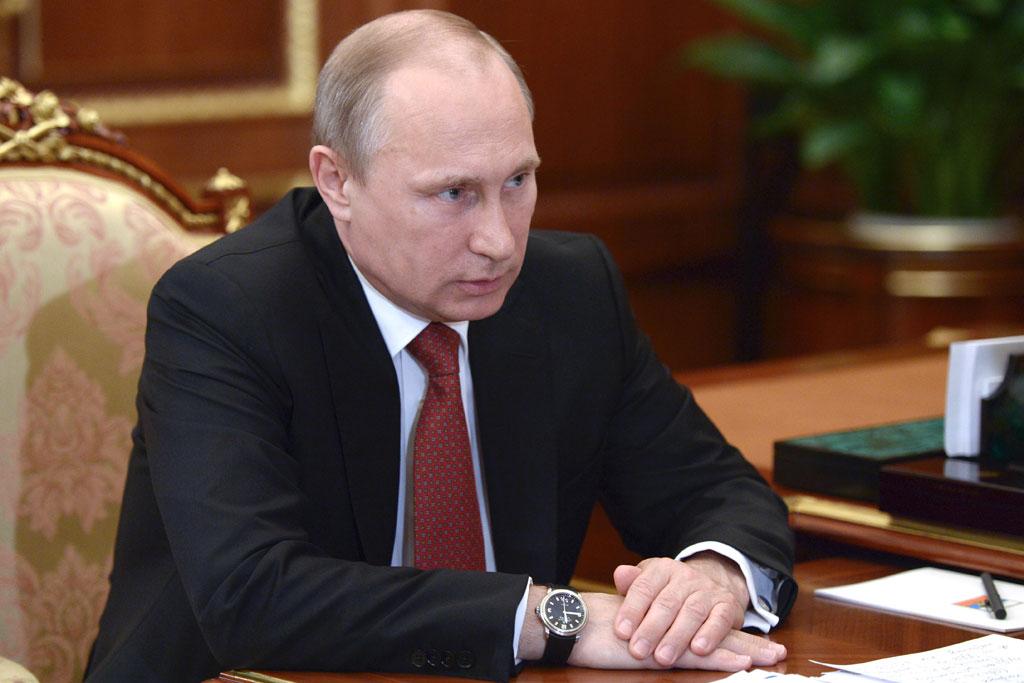Putin asks Russian parliament to revoke the right to send troops to Ukraine
Russia’s President Vladimir Putin attends a meeting in the Kremlin in Moscow, on June 20, 2014.
President Vladimir Putin asked Russia's upper house on Tuesday to revoke the right it had granted him to order a military intervention in Ukraine in defense of Russian-speakers there, the Kremlin said in a statement.
The step seemed certain to be welcomed by the West as a sign that Moscow was ready to help engineer a settlement in Ukraine's largely Russian-speaking east, where a pro-Russian uprising against Kyiv began in April.
Putin's spokesman said the Kremlin leader's move was aimed at assisting fledgling peace talks, which began on Monday, to end the conflict.
Ukrainian President Petro Poroshenko called it a "first practical step" following Putin's statement of support last weekend for Poroshenko's peace plan for eastern Ukraine.
Putin's chief of staff, Sergei Ivanov, said Russia now expected Kyiv to respond with measures of its own, without specifying what these should be. In the March 1 resolution, the Federation Council had granted Putin the right to "use the Russian Federation's Armed Forces on the territory of Ukraine until the social and political situation in that country normalizes."
That resolution, together with Russia's annexation of Crimea from Ukraine, helped push East-West relations to their lowest ebb since the Cold War and led the United States and Europe to impose sanctions on Moscow.
European Union foreign ministers on Monday held out the prospect of further sanctions if Russia did not do more to support a peace process in eastern Ukraine, and also asked it to revoke the March 1 resolution.
Ceasefire
Since then, rebels in eastern Ukraine have agreed to a temporary ceasefire to give time for peace talks in a forum where Russia is represented alongside the Kyiv government and the Organization for Security and Cooperation in Europe.
Poroshenko's welcome for Putin's move was tempered by his announcement that one Ukrainian serviceman had been killed and seven others wounded in what he said were eight ceasefire violations by rebels overnight into Tuesday.
"The president has filed a proposal to the Federation Council on cancelling … the resolution on the use of Russia's Armed Forces on the territory of Ukraine," the Kremlin said in a statement on its website.
Federation Council Speaker Valentina Matviyenko said the chamber would discuss Putin's request on Wednesday.
The deputy head of the chamber's international affairs committee, Andrei Klimov, said he expected the resolution to pass, according to the RIA Novosti agency.
Russia has already pulled back tens of thousands of troops that it had moved close to border earlier in the crisis, adding to Western fears that it was ready to follow its forcible annexation of majority-Russian Crimea with intervention in its ex-Soviet neighbour.
Those troops had also provided an unspoken threat to support the well-equipped but sometimes poorly coordinated rebels in eastern Ukraine against government forces trying to wrest back the towns and administration buildings they had seized.
Like many of eastern Ukraine's Russian speakers, Moscow was infuriated by the toppling in January of President Viktor Yanukovych after he pulled out of an association agreement with the EU in favour of closer ties with Moscow.
New president
Russia denies Kyiv's charges that it has helped foment the separatist unrest and knowingly allowed military equipment to cross into Ukraine or built up forces along the 1,900 km (1,200 mile) joint border.
However, the election last month of billionaire businessman Poroshenko as president appears at least to have reduced fears in Moscow and eastern Ukraine that the country was being run by far-right nationalists ready to trample over the rights of the large Russian-speaking minority in the east.
Since then, the rebels have been gradually losing ground in a conflict where scores have been killed on both sides.
Russia's Foreign Ministry accused the EU on Tuesday of taking a biased view of the crisis in Ukraine. It said the EU had conveniently ignored the fact that Kyiv's military action had caused the deaths of tens of children and driven thousands of civilians to continue to seek refuge on Russian territory.
On Friday, Poroshenko is set to sign a free trade agreement with the European Union — the very pact that Yanukovych rejected in January under heavy pressure from Russia, which had wanted Ukraine's 45 million people to join its own Eurasian Economic Union.
Russia is certain to respond by raising trade barriers to Ukrainian exports in order to protect its markets, adding further strain to an economic relationship already badly soured by Ukraine's refusal to accept an increase in the price of Russian gas, imposed after Yanukovych was toppled.
Russia's Gazprom has now cut off the gas, and its CEO Alexei Miller repeated on Tuesday in Vienna that it must settle $1.95 billion of its debt and pay up front for future supplies before the taps could be reopened.
(Reporting by Alissa de Carbonnel and Gabriela Baczynska, writing by Kevin Liffey; editing by Ralph Boulton)
Every day, reporters and producers at The World are hard at work bringing you human-centered news from across the globe. But we can’t do it without you. We need your support to ensure we can continue this work for another year.
Make a gift today, and you’ll help us unlock a matching gift of $67,000!
